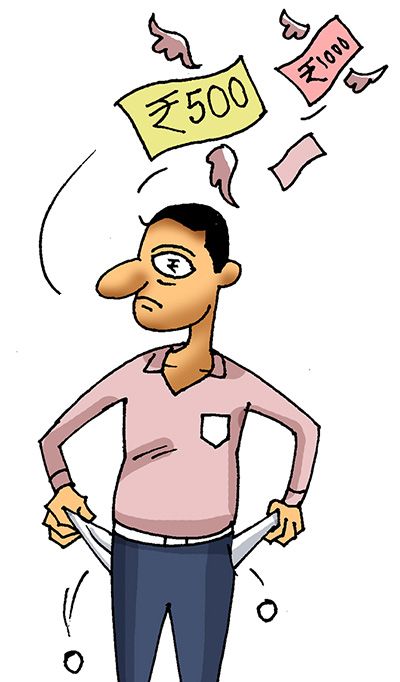Most analysts expect the note ban to sharply hit GVA growth in Q3 and Q4, and the central bank's stance is being called into question.
Business Standard's Ishan Bakshi reports.
Illustration: Dominic Xavier/Rediff.com
 On Wednesday, the Reserve Bank of India slashed its growth forecast for FY17 gross value added (GVA) to 7.1% from 7.6% earlier.
On Wednesday, the Reserve Bank of India slashed its growth forecast for FY17 gross value added (GVA) to 7.1% from 7.6% earlier.
Interestingly, the RBI clarified that of the 50 basis point (bp) decline in growth, the slowdown due to demonetisation is only to the extent of 15 bps.
The balance, it said, is due to second-quarter GVA growth coming in below expectations.
But, as most analysts expect demonetisation to sharply hit GVA growth in the third and fourth quarters, has the RBI been overly optimistic in its full-year growth estimate?
A look at the underlying drivers of growth suggests that growth is likely to have been severely disrupted in the third and fourth quarters of the current financial year.
In the first half of FY17, gross domestic product (GDP) growth was driven largely by consumption, with manufacturing slowing down in the second quarter and investment activity continuing to struggle.
But now consumption, especially household consumption, which largely uses cash as a medium of exchange, is likely to have been hit after November 8.
This should push down aggregate demand, lowering overall growth sharply in the third and fourth quarters.
It is possible that given the unprecedented nature of the move and the level of unpredictability surrounding it, forecasting growth is difficult.
"I don’t think RBI is clear about the impact of demonetisation," says Madan Sabnavis, chief economist, CARE Ratings.
"They seem to have played it safe," Sabnavis adds. "It is possible that they lower their estimates once the third quarter numbers show the actual extent of the downturn."
CARE has lowered its GVA forecast to 6.8%.
"Given the uncertainty, it is difficult to arrive at concrete estimates. At present, we have revised our Q3 FY17 GVA estimate downward by 100 bp relative to the forecast we had before November 8," says Aditi Nayar, principal economist, Icra.
HSBC Global Research believes that while the pain from demonetisation is likely to be temporary, it could be quite high.
Contrary to the RBI's optimistic view, it has projected growth to decline over the current and next quarter by two percentage points lower, averaging to around 5.5% over the third and fourth quarters.
Kotak Institutional Equities has also lowered its FY17 GVA estimate to 6.4%.
Rural areas, which typically have a higher share of cash transactions, are likely to have been hit the most. \
This is likely to have grave repercussions for firms heavily reliant on rural areas such as FMCG (fast-moving consumer goods) companies and two-wheelers.
As CRISIL notes, this sharp slowdown in consumption is likely to lead to build-up of inventory, which would force companies to cut back on production.
This could, in turn, delay the expected recovery in private sector investments.
CRISIL has, thus, cut its FY17 GDP forecast by 100 bps to 6.9%.
While analysts have cut their year-end estimates sharply, it is possible that the Advance Estimates for FY17 GVA growth may well show a higher number.
This is because the Advance Estimates, which are to be released in the first week of January, will only take into account data available till December.
But, as most companies will publish their third quarter results only after December, the official numbers in January will not capture the third quarter results when demonetisation was announced.
The only way the ministry of statistics and programme implementation can capture the disruption in economic activity is to look at leading indicators such as sales of commercial vehicles and two-wheelers and sales tax data.
"The January number is likely to be higher,"says Sabnavis, "because it will be based only on two full quarters of data and on data of some leading economic indicators for the third quarter."











